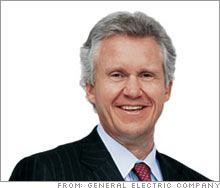GE unveils new 'green' cardGeneral Electric's new eco-friendly credit card might have good intentions behind it, but spending money to save the planet doesn't make sense, writes Fortune's Marc Gunther.(Fortune Magazine) -- With much fanfare, General Electric today introduced a new platinum credit card which, instead of offering cash back or frequent flyer miles, promises to help consumers fight global warming. Unveiled at a crowded press conference at Seven World Trade Center, one of New York's most environmentally-sensitive buildings, the new Earth Rewards MasterCard -- which, of course, comes in several shades of green -- may be the purest example of GE's Jeff Immelt's oft-stated belief that "green is green."
As Lorraine Bolsinger, the GE executive who oversees its Ecomagination campaign, put it: "What's good for the environment can be good for business, and what's good for business can be good for the environment." "Together, we can advance the fight against global warming," said Tom Gentile, the chief marketing officer for GE Money, the giant conglomerate's consumer finance arm. Forgive me, but I don't buy the idea that we can shop our way to a cleaner planet. It sounds too good to be true, and it is. This isn't to question GE's good intentions, or its seriousness. Under the Ecomagination banner, GE (Charts, Fortune 500) is selling billions of dollars of products that are helping to solve environmental problems -- less-polluting aircraft engines, cleaner-burning locomotives, energy-saving washers and dryers, and compact fluorescent light bulbs. It's also part of a corporate-environmental coalition that's lobbying in Washington for mandatory carbon regulation. All good things. The credit card may turn out to be a good thing, too, but it runs the risk of signaling to people that their next trip to the mall will help solve the problem of climate change. It's a small example of a bigger problem: the belief that there are painless solutions to fixing global warming and that it can be a win-win for business, consumers and the planet. In fact, the solutions will be painful for some, they will involve sacrifice for others and they will be developed in Congress and state capitols, not at the mall. Unless you think higher electricity and gas prices are a win-win for all, the changes ahead will be wrenching. To be fair, GE isn't making overblown claims for its Earth Rewards card. "I don't want anyone to think that this is a get out of jail free card," Bolsinger says. "This is one tool among many tools that consumers can use." To that end, GE has also started a website to promote everyday actions to help fight climate change. Here's how the card will work: Consumers will be able to dedicate one percent of their purchases to fund projects that offset carbon dioxide emissions. (They can also opt to get 1/2 of one percent cash back, in which case the other 1/2 of one percent will go to carbon offsets.) GE will then pool those monies and once a year -- on Earth Day, natch -- invest them in verified, transparent carbon offset projects. For instance, a consumer who charges $750 a month, or $9,000 a year, would offset 10 tons of emissions -- the annual carbon footprint of a typical individual, according to GE's Gentile. There's no end to what these offsets could do. They could be used to capture methane gas from landfills, to plant trees, to finance renewable energy projects or to pay for energy efficiency -- all of which reduce greenhouse gas emissions. And unlike some of the more dubious programs, GE has taken steps to ensure that its program is legit. The non-profit Pew Center on Global Change and World Resources Institute were among those who helped develop the offset program. The offsets will be purchased by GE-AES Greenhouse Gas Solutions, a new joint venture of GE and global power giant AES (Charts), that aims to generate 10 million metric tons of carbon credits annually by 2010. In a sign of its goodwill, GE even bought each of us at the press conference 10 tons of emissions offsets -- in theory, making us "carbon neutral" for a year. But it's not nearly as easy as that. I took the Delta shuttle from Washington to New York to attend the event; goodness knows how much carbon dioxide was emitted by that 35-minute flight. Does that mean I should now shop more with my Earth Rewards card, to generate more offsets? Maybe if I charge $20,000 or $30,000 a year, I can become greener? That's ludicrous, of course. There's a reason why the mantra of the environmental movement is "reduce, reuse, recycle." One of the best ways to help save the planet is for people to shop less, drive less, eat less meat, turn down the air conditioning, recycle, don't use plastic bags or drink bottled water -- even hang out laundry to dry. According to green business writer and consultant Joel Makower, GE's isn't the first carbon-focused credit card -- or the last. Dutch-based Rabobank introduced a "Climate Card" this spring and U.K.-based Barclay Bank (Charts) recently announced the Barclaycard Breathe card, which will "donate half of all profits to carbon reduction projects around the world." Bank of America (Charts, Fortune 500) plans to introduce a carbon offset card soon. Having big banks compete over who has the most eco-friendly credit cards is, on balance, a good thing. As GE's Gentile says: "People are going to spend money on credit cards. This is a good step." But let's be clear -- it's just a first step, and we have a hard climb ahead. |
Sponsors
| ||||||||||||||||||

